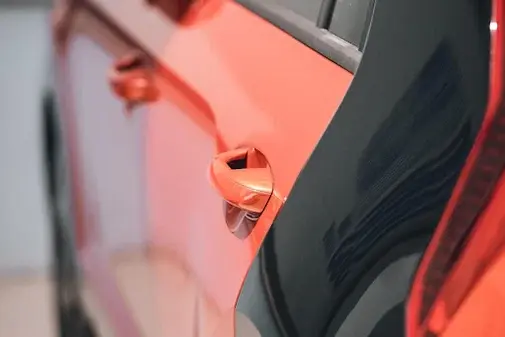Pressure Sensitive Adhesive Trends in the Automotive Supply Chain

Pressure-sensitive adhesives are having an outsized impact on the competitive landscape of the automotive industry in 2024 and beyond. As vehicles continue to electrify, brands expand their supercar applications, and lightweight continues to dominate the industrys goals, PSAs are making inroads across the board as an alternative to heavier and more cumbersome mechanical fasteners.
Join us as we cover the top 4 most notable PSA trends that are already showing themselves in production and that will continue to play a major role as we look ahead.
Lightweighting and Material Diversity
Automakers are pressing up against the limits of what they can accomplish with fuel economy through power and precision, doing everything possible to help vehicles glide faster and smoother on the open road. And yet, emissions guidelines continue to push for improvements.
Pressure-sensitive adhesives and tapes are gaining massive traction in automotive manufacturing, notably in super and hypercars, due to their low weight compared to traditional mechanical fastening solutions. This shift in design philosophy is helping to reduce total vehicle weight alongside the increased percentage of modern vehicles that are composed of lightweight materials like aluminum, composites, and plastics.
PSAs explicitly crafted for these modern often mismatched substrates offer strong adhesion while remaining flexible and lightweight. Meanwhile, many legacy sportscar manufacturers are diving headlong into the burgeoning EV market, which has spurred sales of fossil-fuel-fired, adhesive-laden supercars and hypercars.
Lamborghini recorded its best-ever year of sales in India in 2022, led by the popularity of its supercharged SUV, the Urus. Ferrari has also reported record-breaking sales, seeing their shipments escalate 29% year-over-year. Demand for pressure-sensitive adhesives for lightweight in-performance vehicles is likely to continue to rise exponentially.
Focus on Sustainability
Carbon neutrality is an ever-accelerating concept, and the United Nations has implemented a plan to achieve net-zero emissions by 2050. This places an undue burden on creating automobiles, but it is necessary to take care of our planet effectively and adapt to changing customer demands for vehicles.
Automakers are also increasingly turning to adhesives for car assembly due to their eco-friendly weight-saving benefits and improved fuel efficiency.
A 2022 market forecast highlights the ‘body in white’ stage as a major application area, where adhesives offer advantages like increased strength and durability, decreased weight, and improved fuel efficiency. In fact, the weight of adhesives up to 40 pounds in some vehicles pales in comparison to the weight of metal rivets, screws, and welds that are no longer needed to bond components.
PSAs that enable easy disassembly and material separation are becoming increasingly valuable for end-of-life vehicle recycling.
Advanced Driver-Assistance Systems (ADAS) and Autonomous Vehicles (AVs)
The rise of ADAS and AVs necessitates reliable bonding for critical components like sensors, cameras, and LiDAR systems. PSAs developed for high-performance electronics offer excellent adhesion, temperature resistance, and vibration dampening to ensure these systems function flawlessly.
The future of driving will rely on advanced technology and complex sensors especially with growing electric vehicle trends. This will increase the need for specialized parts and bonding adhesives as stress on research and development increases. PSA tapes are becoming crucial for EV battery design, with applications in areas like thermal runaway protection and cell-to-cell bonding. As EVs become more prominent, the demand for these tapes is expected to grow significantly.
In fact, a major disruption to the automotive industry is the transition to EVs, with battery design and manufacturing playing a central role.
Traditional PSAs might not be enough for the demanding requirements of ADAS and AVs, so we developed high-performance PSAs formulated explicitly for these unique challenges. Automotive foam tapes are ideal for rigid material bonding, especially when each substrate has a variable response to temperature fluctuations.
Interior Design and Aesthetics
Tapes pulled 69.9% of the global market for pressure sensitive adhesives in 2022. Granted, carton sealing in packaging was a major contributor. However, automotive end-uses in the interior and electronic assembly have also been impactful. The modern vehicles interior is expected to be a haven of security and style that drivers have come to know and love. Notably, PSAs offer car manufacturers a cost-effective way to streamline assembly, improve fuel efficiency through lighter vehicles, and potentially adapt to the growing electric car market.
PSA tapes are seen throughout the vehicle interior, bonding decorative trim pieces, headliners, and luxurious or challenging upholstery materials. New trends include PSAs with improved aesthetics, such as clear films for touchscreens, wheels, and displays and low-profile tapes for seamless integration into both interior and exterior designs.
LINTEC Automotive: Your Partner in PSA Innovation
At LINTEC Automotive, we pride ourselves on being at the forefront of developing PSAs that meet the evolving needs of the automotive industry. We offer a wide range of pressure-sensitive adhesive solutions, which include:
- High-performance PSAs for bonding to various substrates
- Durable and weather-resistant PSAs for harsh automotive environments
- Customizable PSA solutions to meet specific application requirements
- Sustainable PSAs that minimize environmental impact
As the trends in PSAs for the automotive supply chain continue to develop, LINTEC Automotive is committed to providing innovative solutions that help you achieve your design goals while considering a fully sustainable future.
Contact us today to discuss your specific needs and learn how our PSAs can help you power the next generation of vehicles.
Get our guide, Protect Your Budget: 10 Automotive Films For the Vehicle Exterior, for more information on how to use automotive films to stay in control of costs in your supply chain.
